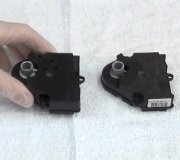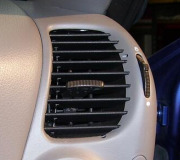I know you have a Mazda but I don't know if they have the same part to solve the same problem. I DO know Chrysler offered the improved version but it was never standard equipment. Also, 95 percent of owners never had a problem or they never noticed it or they didn't bother to complain about it. For those few who did want it solved, they offered that improved check valve and it always took care of it. Often that happened for the first time when the car had high mileage, sometimes it occurred sooner, but I don't recall it ever happening when the car was fairly new. I suspect it has to do with the gradual loss of power at high mileage when you have to push the gas pedal a little harder, but regardless of the cause, the new check valve has a storage canister built in to prevent the problem. I've installed probably 20 of them in my ten years at the dealership.
The original check valve is only about the size of a stack of three nickels. If it leaks even slightly, vacuum will be lost when intake manifold vacuum goes down during acceleration. The mode motors are spring-loaded to force them to go to the defrost position in that case. The replacement with the storage canister is about two inches long and about 1 1/4 inches in diameter.
If you had just noticed this problem occurring once in a while and over months or years it was becoming more frequent, I would lean toward low engine vacuum due to normal high mileage wear. But since you said it started suddenly, and if it does it all the time, I think I'd suspect the check valve has simply failed and a used one from the salvage yard is the answer. If two used ones don't help, then look into the valve with the storage canister.
As for the compressor kicking on and off, that depends on how the system works and if it is low on charge. If it has never been repaired in 14 years it is likely low on charge and there's no other real problem other than adding refrigerant. The problem is there's no accurate way to know how much is in the system now without draining it all out and putting a measured amount back in. By the mid '90s some manufacturers were using "variable displacement compressors" that adjusted their output based on the pressure of the refrigerant coming into it. They were intended to run continuously so you didn't get that thump each time it cycled on. If that type of compressor is kicking out intermittently it is because the system is low on charge and the low-pressure cutout switch is turning it off to prevent sucking in outside air, and the harmful moisture with it, through a leak.
On other systems the compressor is supposed to cycle on and off. Along with the "expansion valve" that controls the flow of refrigerant into the dash board, that is part of how the system regulates. You don't want the compressor building dangerous higher and higher pressures when there's no place for that refrigerant to go. With those systems, the compressor running for a few seconds followed by a long off-time, and cold air from the ducts means it's working great. Rapid cycling on and off, usually accompanied by not-so-cold air means it's low on charge.
If those generalizations don't help you figure out if what's happening is normal, you'll need a pair of gauges to see what the high and low side pressures are. By reading those gauges and by feeling where the refrigerant becomes cold in the system, an experienced AC mechanic can tell what's wrong. For the rest of us we just have to suck out what's left in the system, then put the specified amount in to eliminate under and over-charge as a possibility.
Friday, September 28th, 2012 AT 10:32 PM


